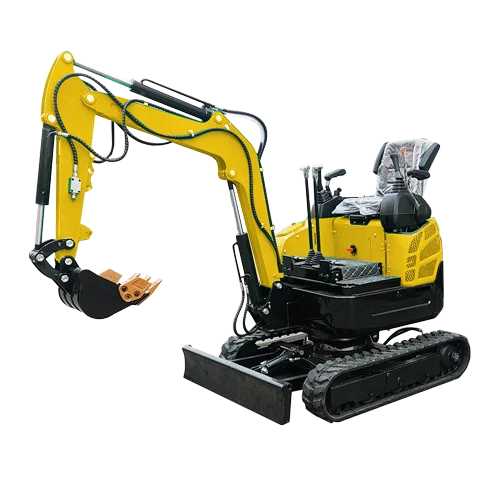Welcome to My Blog!
Before we dive into the content, I’d love for you to join me on my social media platforms where I share more insights, engage with the community, and post updates. Here’s how you can connect with me:
Facebook:https://www.facebook.com/profile.php?id=100087112105480
LinkedIn:https://www.linkedin.com/showcase/99327366/admin/dashboard/
Now, let’s get started on our journey together. I hope you find the content here insightful, engaging, and valuable.
Introduction

In today’s world, homeowners and DIY enthusiasts are increasingly recognizing the value of having their own machinery for various landscaping and construction tasks. A small household excavator can be an invaluable tool for completing projects efficiently and effectively. However, with so many options available, selecting the right small household excavator can be overwhelming. This guide will walk you through the essential factors to consider, helping you make an informed decision that suits your needs.
Understanding Small Household Excavators
A small household excavator is a compact and versatile machine designed for light to medium excavation tasks around the home. These machines typically weigh between 1 to 4 tons and are equipped with various attachments that allow for digging, lifting, and moving materials. Whether you’re planning a garden renovation, a small landscaping project, or home improvements, a small excavator can save you time and effort.
Key Features of Small Household Excavators
| Feature | Description |
|---|---|
| Operating Weight | 1 – 4 tons |
| Engine Power | 15 – 50 horsepower |
| Digging Depth | Up to 3 meters |
| Bucket Capacity | 0.1 – 0.3 cubic meters |
| Maneuverability | High, suitable for confined spaces |
These features make small household excavators highly suitable for residential projects.
Benefits of Owning a Small Household Excavator
Increased Efficiency
One of the primary benefits of owning a small household excavator is the increased efficiency it brings to your projects. Tasks that would typically take days or weeks can be completed in a matter of hours. This efficiency allows you to move on to other projects or enjoy your outdoor space sooner.
Versatility of Use
Small excavators can be used for a wide variety of tasks, including:
- Digging foundations for small structures
- Creating trenches for drainage
- Landscaping and grading
- Lifting and moving heavy materials
- Breaking up concrete or asphalt
This versatility makes them an excellent investment for any homeowner.
Cost-Effectiveness
Hiring professional services for excavation can be costly. By investing in a small household excavator, you can save money in the long run by handling projects yourself. Additionally, many small excavators are available for rent, providing further flexibility based on your budget and project needs.
Improved Safety
Using a small household excavator can enhance safety on job sites. These machines allow you to perform tasks from a secure operator’s seat, minimizing the risk of injury compared to manual labor methods. Furthermore, many small excavators come equipped with safety features such as rollover protective structures (ROPS) and seatbelts.
Factors to Consider When Choosing a Small Household Excavator
Project Requirements
Before selecting a small household excavator, consider the specific requirements of your project. What tasks do you need the excavator to perform? Will you be digging deep holes, or do you need it mainly for landscaping? Understanding your project’s requirements will help you choose the right excavator type and size.
Size and Weight
The size and weight of the excavator are crucial factors, especially if you have limited space to work in. Smaller excavators are more maneuverable and can access tight areas more easily. However, ensure that the excavator you choose is powerful enough to handle the tasks you intend to perform.
Engine Power
Engine power is an important consideration when choosing a small household excavator. Generally, more powerful engines can handle heavier tasks and operate more efficiently. Look for models with sufficient horsepower to meet your project needs without being overkill.
Attachments and Accessories
Attachments significantly enhance the functionality of a small excavator. Consider what types of attachments are available for the models you are interested in. Common attachments include:
- Buckets of various sizes
- Augers for drilling holes
- Hydraulic breakers for demolition
- Grading blades for leveling surfaces
Having a range of attachments can make your excavator more versatile and capable of handling different tasks.
Fuel Efficiency
Fuel efficiency is an important factor to consider, especially if you plan to use the excavator frequently. Look for models that are designed to be fuel-efficient, which can help you save money on operating costs over time.
Budget
Your budget will play a significant role in your decision-making process. Small household excavators can vary widely in price, so determine your budget before shopping. Keep in mind that while higher-priced models may offer more features, you should also consider the overall value and your specific needs.
Brand Reputation and Support
Choose a reputable brand with a history of producing reliable small household excavators. Research customer reviews and seek recommendations from friends or family. Additionally, consider the availability of customer support, parts, and service in your area.
Comparing Different Types of Small Household Excavators
To better understand the options available, it can be helpful to compare different types of small household excavators. Below is a table outlining the features of various types of small household excavators.
| Type | Size | Power | Ideal For | Pros |
|---|---|---|---|---|
| Mini Excavator | 1 – 2 tons | 15 – 25 HP | Small landscaping projects | Highly maneuverable, compact |
| Compact Excavator | 2 – 3 tons | 25 – 40 HP | Digging and lifting tasks | Versatile, good stability |
| Standard Mini Excavator | 3 – 4 tons | 40 – 50 HP | Heavy-duty residential work | More power for demanding tasks |
This comparison helps to highlight the unique features and benefits of each type.
Maintenance Tips for Small Household Excavators

Once you have selected your small household excavator, proper maintenance is key to ensuring its longevity and performance. Here are some maintenance tips:
Regular Inspections
Conduct regular inspections of your excavator, checking for any signs of wear or damage. Pay attention to the hydraulic system, tracks, and engine components.
Change Fluids and Filters
Follow the manufacturer’s recommendations for changing engine oil, hydraulic fluid, and filters. Regular maintenance of fluids and filters is crucial for optimal performance.
Clean After Use
After each use, clean the excavator to remove dirt and debris. This practice helps prevent rust and wear on the machine’s components.
Store Properly
When not in use, store your small household excavator in a dry, covered area to protect it from the elements. If possible, keep it on a flat surface to avoid strain on the tracks.
Train Operators
If multiple people will be using the excavator, ensure that they are trained in its operation and safety features. Proper training minimizes the risk of accidents and equipment damage.
Conclusion
Choosing the right small household excavator can significantly impact your ability to complete various projects around your home efficiently. By considering factors such as project requirements, size, engine power, and budget, you can make an informed decision that meets your specific needs.
Investing in a small household excavator not only saves time and money but also enhances safety and versatility in your DIY endeavors. With the right excavator and proper maintenance, you can tackle any project with confidence.
FAQ
What is a small household excavator?
A small household excavator is a compact machine designed for light to medium excavation tasks around the home, typically weighing between 1 to 4 tons.
What tasks can I perform with a small household excavator?
You can use a small household excavator for various tasks, including digging foundations, landscaping, trenching for drainage, and moving heavy materials.
How do I choose the right size of excavator?
Consider the specific tasks you plan to perform and the space available for maneuvering. Smaller excavators are better for tight spaces, while larger models can handle more demanding tasks.
Are small household excavators fuel-efficient?
Many small household excavators are designed to be fuel-efficient, which can help reduce operating costs over time.
What types of attachments are available for small household excavators?
Common attachments include buckets, augers, hydraulic breakers, and grading blades, allowing for a variety of tasks to be performed.
